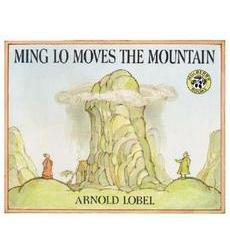Will Donnelly is a PhD candidate in literature and creative writing at the University of Houston. His work has appeared or is forthcoming in Fiction Southeast, Hobart, The Potomac Review, and elsewhere.
How My Writing Gets Written
Will Donnelly
Feb 17, 2013
In 1982, children's book author Arnold Lobel published
Ming Lo Moves the Mountain. In it, Ming Lo and his wife live next to a mountain that causes them nothing but trouble. Rocks fall from the mountainsides, their garden is always in shadow, clouds around the mountain's peak cause rain to fall day and night. Ming Lo and his wife want the mountain gone, so Ming Lo asks a wise man in a nearby village for advice. The wise man offers several suggestions for how Ming Lo might actually move the mountain, but only one idea works. For the mountain to move, Ming Lo and his wife must disassemble their house and strap the parts of it to their backs.
 |
Then they face the mountain, close their eyes, and begin a special dance. The dance goes like this: Take three steps back, one step forward, three steps back, one step forward, three steps back, and so on, for a long, long time. Once they have danced this way for many hours, they stop dancing and open their eyes, and behold--the mountain has moved far away.
It's a joke, of course, and it's funny because we can see the truth of the situation in a way that Ming Lo and his wife can't, but I think it's one of the best metaphors for my writing process that I've ever found.
People often ask me, "How do you write?" I know what they mean. I want to ask the same of other writers all the time, and I try to answer them as helpfully as I can, but the honest truth is that I don't really know. What I
do know is how I
don't write. I don't write by making up excuses for not sitting down at the computer, by fooling around on the Internet when I do sit down, by waiting for inspiration to strike a fire inside my heart when I'm least expecting it. That's how writing
doesn't happen.
Two important things I've learned about myself: 1. Inspiration doesn't exist for me, or at least not in the way I used to think it did, and 2. I always have writer's block.
Always.
I used to think that authors like John Updike and Flannery O'Connor and Toni Morrison were constantly (or at least regularly) inspired, and that all they had to do was to sit down at their desks and feel the genius pour out of them and onto the page. Or even better, that their genius was like an angry ghost fighting its way out of their bodies, something that they couldn't even contain. These days, though, after years of working to summon ghosts like those inside myself, I think differently. I can sit for hours at my keyboard, thinking, dreaming, trying, and a tiny spark of an idea might finally present itself, but that's it. The next day, the same thing might happen, and the next. And that, to me, is the trick of inspiration. We think that it all just arrives in one fell swoop, and maybe for the lucky ones it does, but not for me. For me, it happens, but it happens very, very slowly, and only in small increments. It never feels like
inspiration.
I read a quotation from Richard Bausch the other day in which he talked about how it took Michelangelo four years to paint the ceiling of the Sistine Chapel, and how nobody's inspired, constantly, for four years straight. Much of that time (99 percent of it, if he was anything like me) was spent lying on his back up on that scaffolding, feeling frustrated and bored and tired and just wanting for the whole ordeal to be over. Yet there he was, every day, working. (And thank God that he was, because look how
that turned out.)
 You don't see the Almighty waiting around for "inspiration."
You don't see the Almighty waiting around for "inspiration."
Writer's block is the opposite of inspiration, and yet the two are connected. If you wait to be inspired, you'll meet with writer's block. Me, I can't control the inspiration. I've accepted that. But I can fight the block, and so I do it all the time. I'm like a boxer in the ring, always looking for an opening, because if I'm not looking for one, I'll never find one, and if I never find one, I'll never land a punch. My nose might be bloody, and I might even get knocked down now and then, but I won't give up, and in the process I'm getting stronger all the time. And somehow, after all that fighting, I realize something strange: I've created a story, or a novel, or a poem. I don't quite know just how it got there, but it did.
So the next time you see me at my writing desk or at a library with my computer open or sitting in a coffee shop with a pad of paper and a pen, you might think I'm just some guy wasting time, staring into space, looking angry or heartbroken or bored, but you'll be wrong. I'm dancing. My moves aren't exactly smooth. My eyes may be closed, and I may be moving backward just as much as forward, but I'm moving mountains. I'm just doing it one clumsy step at a time.

 You don't see the Almighty waiting around for "inspiration."
Writer's block is the opposite of inspiration, and yet the two are connected. If you wait to be inspired, you'll meet with writer's block. Me, I can't control the inspiration. I've accepted that. But I can fight the block, and so I do it all the time. I'm like a boxer in the ring, always looking for an opening, because if I'm not looking for one, I'll never find one, and if I never find one, I'll never land a punch. My nose might be bloody, and I might even get knocked down now and then, but I won't give up, and in the process I'm getting stronger all the time. And somehow, after all that fighting, I realize something strange: I've created a story, or a novel, or a poem. I don't quite know just how it got there, but it did.
So the next time you see me at my writing desk or at a library with my computer open or sitting in a coffee shop with a pad of paper and a pen, you might think I'm just some guy wasting time, staring into space, looking angry or heartbroken or bored, but you'll be wrong. I'm dancing. My moves aren't exactly smooth. My eyes may be closed, and I may be moving backward just as much as forward, but I'm moving mountains. I'm just doing it one clumsy step at a time.
You don't see the Almighty waiting around for "inspiration."
Writer's block is the opposite of inspiration, and yet the two are connected. If you wait to be inspired, you'll meet with writer's block. Me, I can't control the inspiration. I've accepted that. But I can fight the block, and so I do it all the time. I'm like a boxer in the ring, always looking for an opening, because if I'm not looking for one, I'll never find one, and if I never find one, I'll never land a punch. My nose might be bloody, and I might even get knocked down now and then, but I won't give up, and in the process I'm getting stronger all the time. And somehow, after all that fighting, I realize something strange: I've created a story, or a novel, or a poem. I don't quite know just how it got there, but it did.
So the next time you see me at my writing desk or at a library with my computer open or sitting in a coffee shop with a pad of paper and a pen, you might think I'm just some guy wasting time, staring into space, looking angry or heartbroken or bored, but you'll be wrong. I'm dancing. My moves aren't exactly smooth. My eyes may be closed, and I may be moving backward just as much as forward, but I'm moving mountains. I'm just doing it one clumsy step at a time.

Comments (1)
Sean Standish:
Mar 06, 2013 at 04:46 PM
Absolutely. Here's a comment I left on a friend's FB link to this article: work > inspiration. I only disagree with (though I sympathize with the feeling/expression) of *always* having writer's block. It's a funny thing to say, but it's also an expression based on, it seems to me, dividing the world into "inspired" and "blocked". In reality what we are is not blocked but *cold*. It's like warming up in a pool. You jump in and thrash around and that's how you get warm. Not that that necessarily has anything to do with the quality of the work, that has to be determined and affirmed later, but it does make you feel better working. Also, "work vs inspiration" makes it sound like we are more actively controlling the work, but in fact the will of the work is just as apart from us as the will of an inspiration. The point of work is to actively submit ourselves to the will of the work. I'm saying that -- and this is merely my opinion and shouldn't change someone's mind if their experience contradicts it -- worthwhile inspiration only comes through work. I personally distrust inspirations arising outside of work, and feel that they still leave me having to work my way inside the work; an inspiration truly outside of the work doesn't help much with finding your way in, ime.
Add a Comment